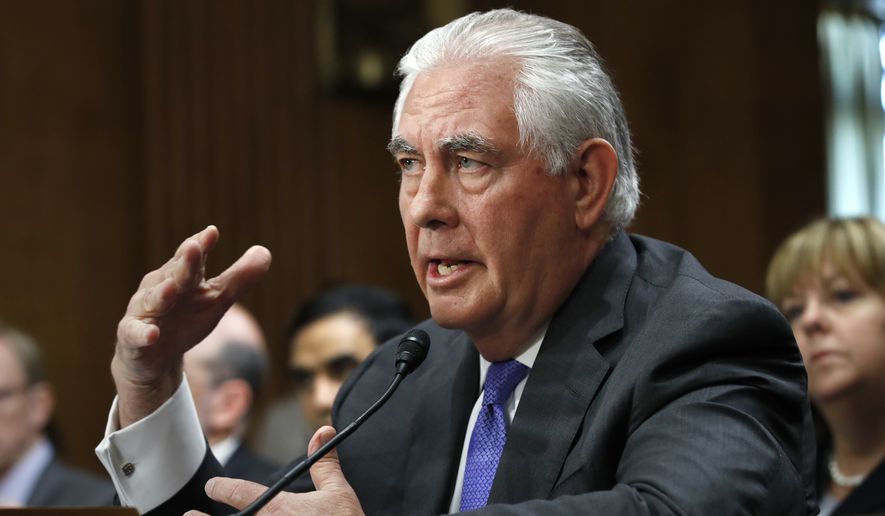Secretary of State Rex W. Tillerson said President Trump’s call for a 28 percent reduction in U.S. diplomacy and foreign aid spending in 2018 won’t negatively impact America’s ability to be the world’s leader in helping other nation’s pursue democracy and grow economically.
In his first major budget hearing since becoming secretary of state in February, the former ExxonMobil CEO told lawmakers Tuesday that the administration will “ask other donors and private sector partners to increase their support” to compensate for cuts in State Department and USAID initiatives.
“Even with reductions in funding, we will continue to be the leader in international development, global health, democracy and good governance initiatives, and humanitarian efforts,” Mr. Tillerson said in prepared testimony before the Senate Foreign Relations Committee.
“If natural disasters or epidemics strike overseas, America will respond with care and support,” he told senators, who were poised to scrutinize President Trump’s plan for a combined State Department and USAID budget of $37.6 billion — in contrast to a roughly 10 percent increase at the Pentagon that would bring defense spending to $603 billion next year.
Mr. Tillerson suggested major defense-related issues facing Washington — from Chinese military muscle flexing in East Asia, to the ongoing Islamic State terror threat and Iranian provocations in the Middle East — serve as a justification for the increase in Pentagon spending while decreasing the budget for U.S. diplomacy and aid.
“With such a broad array of threats facing the United States, the FY 2018 budget request of $37.6 billion dollars aligns with the administration’s objective of making America’s security our top priority,” he said. “The first responsibility of government is the security of its own citizens, and we will orient our diplomatic efforts toward fulfilling that commitment.”
“Despite necessary reductions from FY 2017 levels,” he added, “we are still devoting $25.3 billion to foreign assistance, which accounts for over two-thirds of the State and USAID budget.”
“This entails $7.1 billion in security assistance programs, and $5.6 billion, including our diplomatic engagement, to defeat ISIS and other terrorist organizations,” Mr. Tillerson said. He also noted the budget request calls for “funding for Diplomatic Security operations [to] increase by approximately 11 percent” from 2016 levels.
But an issue likely to rear its head Tuesday has to do with the Trump administration’s slowness in filling top diplomatic positions since taking office in January — including a permanent assistant secretary for diplomatic security.
The White House has so far not nominated any candidates for more than two dozen undersecretary and assistant secretary posts at the State Department.
While most of the positions are being run on an “acting” basis by veteran State Department officials, analysts and former diplomats say the dearth of administration-appointed people for the jobs could make it far more challenging for Mr. Tillerson to do his job and push through serious policy shifts outlined by the president.
• Guy Taylor can be reached at gtaylor@washingtontimes.com.




Please read our comment policy before commenting.